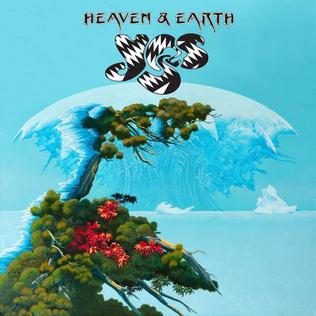
Heaven and Earth (2014)

1. Believe Again
2. The Game
3. Step Beyond
4. To Ascend
5. In a World of our Own
6. Light of the Ages
7. It Was All We Knew
8. Subway Walls
This is one of those albums that makes you stop and ask, “What in the hell went wrong here?” Maybe that’s a little harsh—but let’s be honest, it’s not exactly unearned. Over the decades, Yes has certainly shown a knack for occasionally releasing a clunker, and given the band’s revolving-door lineup and relentless need to experiment, it was almost inevitable they'd strike out once in a while. Enter Heaven & Earth, the sort of release that has you scratching your head in disbelief that anyone thought it was ready for prime time.
Jon Davison is the new front man here, and to his credit, he’s not the issue. He’s got that airy, Jon Anderson-ish quality that Benoit David had on Fly From Here, and if anything, he’s a perfectly serviceable fit in the role. But the writing credits tell a different story—Davison is all over them, which would be fine if the well hadn't apparently run bone-dry for everyone else. You can’t help but wonder if the rest of the band simply didn’t have anything left to offer and leaned a bit too heavily on the new guy to steer the ship.
What really sinks this record is that it sounds like they were aiming for a slick, radio-friendly pop vibe—a goal that, on its face, shouldn’t be a crime. But these songs are just so tepid and uninspired that they leave no lasting impression whatsoever. It’s one of those albums that practically demands you ask: didn’t anyone in the studio realize what they were making? Was there no point where someone—anyone—stood up and said, “Guys, this just isn’t working”?
Adding to the confusion is that they brought in superstar producer Roy Thomas Baker. On paper, that sounds like a coup. This is the guy with a resume that should guarantee at least some level of quality control. But he seems an odd choice for Yes—though, to be fair, Bruce Fairbairn seemed an odd choice too, and he gave us the excellent The Ladder in 1999. Maybe Baker was hamstrung, just following instructions without much room to actually shape things. Whatever the story, his name on the credits doesn’t save this one from sounding flat and half-baked.
Even when the band tries to slip in their classic prog-rock flourishes, it comes off awkward and unfocused. Much of the album feels like a collection of unfinished demos rather than a polished final product. There is one saving grace—the final track, Subway Walls, isn’t half bad. But being buried at the end of this slog, it’s almost too little too late; by the time you get there, you’re already exhausted and ready to eject the disc.
What really makes all of this worse is the bitter historical footnote: this would turn out to be the last studio album to feature Chris Squire. Whether or not his illness was known at the time, he would pass away the following year from leukemia. It’s genuinely heartbreaking that such an essential, defining member of Yes ended his recording legacy with this misfire. He deserved so much better—a true swan song instead of this muddled farewell.
Go to the Next Review
Go back to the main page